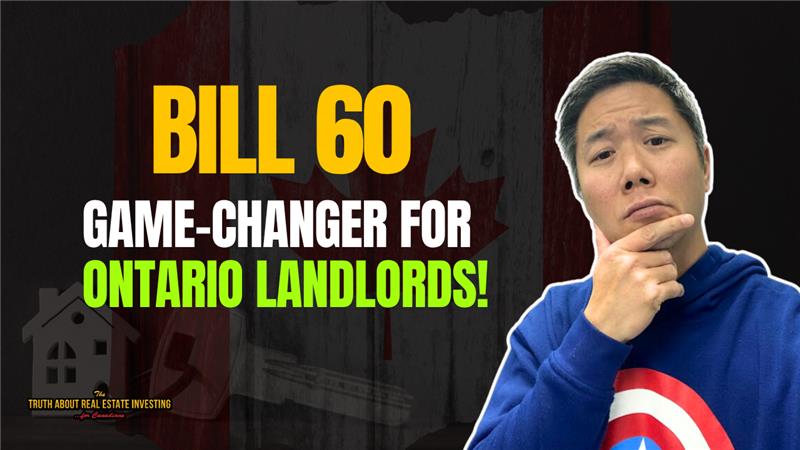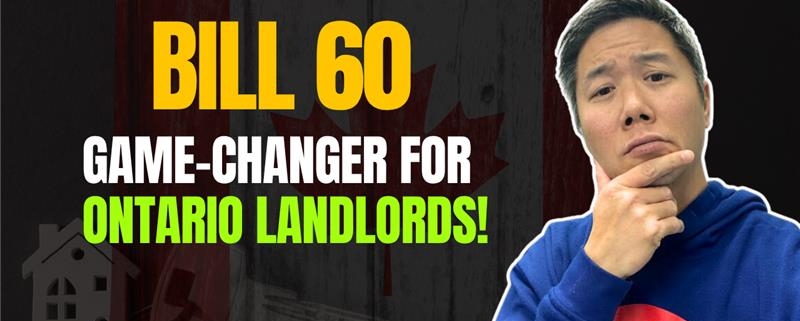Ontario’s Bill 60: What Landlords Need to Know

Recorded: November 2025
Host: Erwin Szeto, The Truth About Real Estate Investing for Canadians Podcast

Bill 60 has all my landlord friends and the Facebook groups I am part of talking, especially SOLO, which is an excellent group. There are some really interesting items in the bill and a few ideas I am not surprised were quickly rejected by Toronto Mayor Olivia Chow and tenant advocates. Let us break down what Bill 60 actually means for landlords.
Lease agreement expiry
I am not entirely sure why ending month-to-month leases was included, but when I think about it, if the old rule of automatic month-to-month conversion were grandfathered and the new rule required a lease to be renewed at the end of each term, we would likely see more landlords enter the rental market or make space in their homes available for long-term rental.
Take, for example, a homeowner with a self-contained unit. In Ontario, once the lease is signed and the tenant moves in, the homeowner loses nearly all rights to their own property. That is a significant risk. Remove that risk and more people would be willing to become landlords. It would also hold tenants more accountable to be good neighbours so they are invited to stay. I was literally reading a thread in an Ontario landlord group where someone asked if they should rent their self-contained unit to a friend for one or two months. The majority of the forty-plus responses said no. Doug Ford has said he wants more landlords to step forward and offer housing, but to do that you must protect landlords and their property rights. Again, grandfathering existing leases would protect the most vulnerable in rent-controlled buildings.
Removing the ability to raise new issues on the day of a rent arrears hearing
This would never be allowed in a court of law, yet it is currently allowed at the Landlord and Tenant Board. Bill 60 would strictly require prior notice, which should reduce delays at the Board.
Here is my favourite initiative in Bill 60: limiting new issues unless fifty percent of the arrears are paid
This would reduce delays when a tenant wants to dispute non-payment of rent on the basis of unsafe conditions, improper maintenance, or needed repairs. If the tenant truly has the rent, then let them demonstrate it by depositing half. It prevents abuse of the system.
Limiting when the Landlord and Tenant Board can review decisions
Before the pandemic this was extremely rare. During the pandemic it became the playbook for how to stay in a property without paying indefinitely. A tenant or their legal representative, often funded by taxpayers, would introduce new evidence again and again, triggering repeated reviews and lengthy delays. Bill 60 aims to limit these reviews.
Persistent late payment cases
It is currently undefined what “persistent” means, so Bill 60 plans to define it. This should create more consistency.
Reducing the appeal period from thirty to fifteen days
This will lead to faster resolutions.
Compensation requirements for landlord’s own use
Under Bill 60, if the landlord provides four months’ notice, they would not have to provide compensation. Again, if existing tenants are grandfathered, this could encourage homeowners to rent out their properties or invest in additional rental properties.
Shortening the rent arrears eviction notice period
Reducing the N4 notice period from fourteen to seven days allows the landlord to file with the Landlord and Tenant Board one week sooner. The province says it currently takes eight to nine weeks on average to obtain a hearing, and tenants can pay at any time or request a payment plan. Tenants have all the rights in these situations.
Postponement of an eviction order
I understand that adjudicators want to avoid homelessness and often delay the enforcement of eviction orders for compassionate reasons, but this can come at the expense of private landlords who receive neither consent nor compensation. I had a client whose tenant did not even show up to the non-payment hearing, and it still took five months from the hearing date to receiving the eviction order. Bill 60 wants to establish clear factors for when a postponement is actually allowed.
Adding up to eight temporary sheriffs
These are the people who physically enforce eviction orders, and I have heard that some regions have severe backlogs and are severely understaffed. It is not an easy job. They are evicting tenants from their homes every day, and more staffing is necessary.
Greater access to Landlord and Tenant Board decisions and orders
Bill 60 wants to increase public access so both tenants and landlords can perform due diligence before signing a lease. This sounds similar to what Weiting at Open Room is already doing.
🎧 Listen to the full episode here
Save the date
How to Sell Investment Property for Maximum ROI. Online-Only Live Masterclass | Tuesday, January 13th · 8:00 PM EST
If you’re thinking about selling in 2026, join us on January 13th at 8 p.m. Eastern for our free IWIN training: “How to Sell an Investment Property for Maximum ROI.”
We’ll walk through:
- Real examples of deals that sold vs. deals that pivoted to Plan B.
- How to price properly in a market full of bank sales and estate sales.
- Tenant strategies that make your property more attractive — or at least not a liability — when you hit MLS.
In this market, you don’t have to get crushed. You just have to be smarter than the average seller.
Wealth Summit 2026 · Hybrid (In-Person + Online) | Saturday, January 31st · 9:00 AM EST
Ready to make 2026 your smartest financial year yet? Join us for Wealth Summit 2026, where real estate, tax, and wealth-planning experts break down the proven blueprint for protecting and multiplying your wealth.
Early-bird registration is now open — save 40% when you secure your spot early. Seats for the in-person experience are limited and always sell out fast.
Discover the frameworks, tax strategies, and legacy tools top performers use to stay ahead — no matter the market.
To Listen:
On Spotify: https://open.spotify.com/episode/1V4X0bkYHiYfTUtATPJ0nu?si=iPmLFpn_QDGQbuH4y1DKvg
Audible: https://www.audible.ca/pd/B0G3B9WQPB?source_code=ASSGB149080119000H&share_location=pdp
YouTube: https://youtu.be/f3hbi7e5CEo
You’ve Built Wealth. Now It’s Time to Understand It.
You’ve Built Wealth. Now It’s Time to Understand It.
After dozens of consultations, I’ve noticed the same pattern again and again: most investors have built real wealth, but they’re not confident they can retire from it. They’re sitting on $2M–$5M in property but feel cash-flow poor. They’re paying more tax than they should because everything is held in personal names. They have no liquidity, no insurance strategy, and no clear plan for what happens if something happens to them. And almost every single client tells me the same thing: “I don’t actually know what retirement looks like for us.”
Real estate builds equity, but it doesn’t automatically build freedom. Without a coordinated plan for taxes, income, protection, and exit strategy, investors often end up working harder in retirement than they did in their 30s. That’s why I created the Wealth Freedom Blueprint – a simple, practical guide to help you understand where you stand today, what gaps are costing you money, and how to turn the wealth you’ve built into a life you can actually live.
Download your free Wealth Freedom Blueprint
Final Thoughts
Whether you’re building wealth, protecting it, or preparing to transition it, you deserve a clear, tax-smart strategy that works in real life.
That’s what iWIN Wealth Planning is here for.
This is how we’re creating predictable, stress-free wealth for Canadian families…
so you can enjoy the life you’re building.
Book your Wealth Planning Call
Sponsored by… Me!
This episode isn’t sponsored—except by my wife Cherry and me. Real estate investing is our life. It’s helped us build wealth and achieve peace of mind about retirement and our children’s future.
Till next time—just do it. I believe in you.
Erwin Szeto
W: erwinszeto.com
FB: facebook.com/erwin.szeto
IG: @erwinszeto
Disclaimer
As a committed advocate for transparent and responsible investing, I want to disclose that I am an Advisor to SHARE SFR (Single Family Rental). I hold equity in the company and earn referral commissions from clients I refer.
My endorsement of their model—focusing on positive cash flow and direct ownership—is based on personal experience and belief. Still, every investor should do their own due diligence.




Leave a Reply
Want to join the discussion?Feel free to contribute!